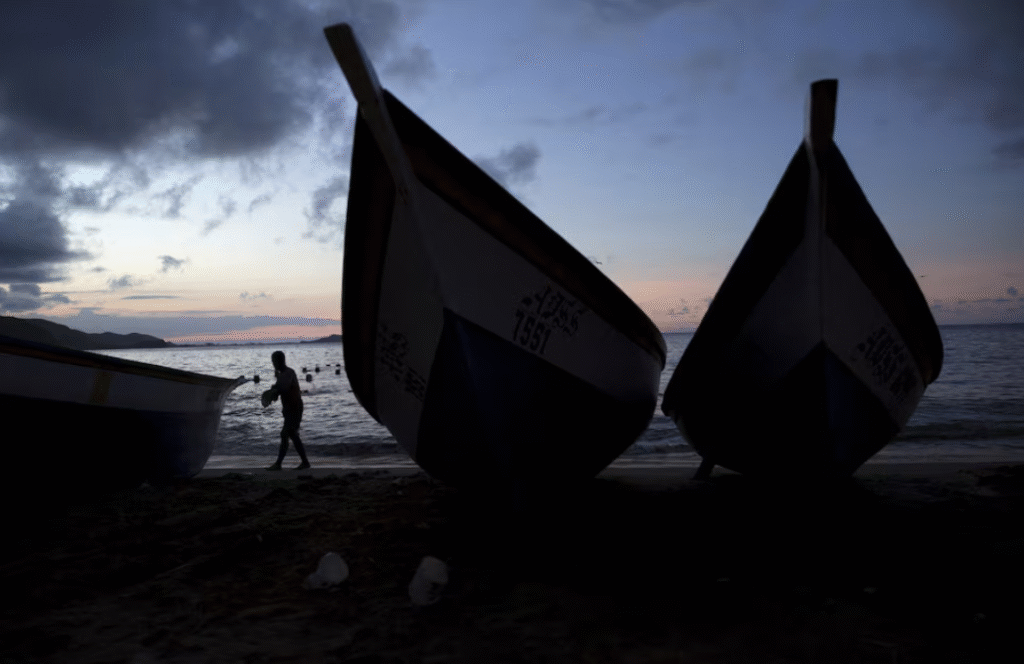CARACAS (Reuters) — U.S. bombings of alleged drug boats have led to stepped-up surveillance by authorities in Venezuela’s remote northeastern state of Sucre, with increased patrols by security agencies and ruling-party supporters stoking fear among locals, four residents and one recent visitor said.
Sucre, whose narrow eastern isthmus extends into the Caribbean to within about 7 miles (11 km) of Trinidad and Tobago, was home to some of the more than 80 people killed so far in Washington’s months-long campaign of off the Venezuelan coast and in the Pacific. The state is Venezuela’s second-poorest and some 60% of people there are employed by the government.
Reuters reported on Saturday that to launch a new phase of Venezuela-related operations.
The Trump administration says the strikes have damaged the operation of drug cartels, including groups it says are led by Venezuelan President Nicolas Maduro. Maduro and his government have always denied any involvement in crime and accuse the U.S. of seeking regime change out of a desire to control Venezuela’s natural resources, especially its vast oil reserves.
The increased surveillance may speak to the Maduro administration’s desire to more tightly control a region long dominated by criminal activity – including drug smuggling.
Two relatives of people from Sucre who were killed in boat strikes, who both asked to remain anonymous for fear of reprisals, said they were visited by police and officials from the Bolivarian National Intelligence Service (SEBIN) spy service soon after the bombings.
Authorities searched their homes and warned them not to post about their loved ones’ deaths on social media. The relatives said they have not received any official information and are not aware of any investigation into their relatives’ deaths.
Washington has released no details about Venezuelans killed in the strikes and Caracas has not disclosed names. Bodies of the men have not been recovered and families have not been able to hold funerals.
Four residents in the seaside town of Guiria – whose economy survives mostly on maritime smuggling of contraband, including drugs, and has suffered amid the strikes – told Reuters they have seen a rise in the number of security personnel from a variety of agencies since mid-September, with the patrols further increasing in the last two weeks.
The Venezuelan communications ministry, which fields all press inquiries for the government, did not respond to a request for comment on the increased security activity in Sucre. The government says the country is a democracy and that security forces act in accordance with the law.
Reuters was not able to determine why the Venezuelan government sent more agents into Sucre, but counterintelligence and surveillance of troops and citizens – especially by the Directorate General of Military Counterintelligence (DGCIM) and SEBIN – are central pillars of Maduro’s rule, according to international observers, rights groups, former soldiers and opposition lawmakers.
The DGCIM, sanctioned by the United States and under investigation by the International Criminal Court, has been accused of systematic abuses including torture and extrajudicial execution. SEBIN surveillance targets opposition figures, journalists and others.
The personnel patrolling in Sucre are sometimes in plain clothes and use sedans and SUVs, said the witnesses, who said they were recognizable because they are not from the town. In other instances, witnesses saw uniformed officials from SEBIN, the armed forces, the DGCIM and national police carrying out patrols, especially at night.
“They pass through the same areas many times, at all hours. Before, they weren’t so persistent, now they’re everywhere all the time,” said a community leader who requested anonymity for safety reasons.
‘No money circulating’
A merchant, also speaking on condition of anonymity, said most patrols are carried out on motorcycles and in police vehicles. The patrols include civilian members of ruling party-allied motorcycle groups known as “colectivos” or collectives.
“They’re all organized by the government – civilians and police go together supervising the streets,” he said. “Everything seems calm except for the increased surveillance in the town.”
The patrols, which locals said increased after the announcement of joint military exercises between the United States and Trinidad and Tobago in late October, have led to arrests, said two of the residents.
Residents also reported the presence of checkpoints in some areas and said it is often unclear who is running them.
Guiria’s local economy, which beyond drug trafficking is also partly sustained by informal trade in food and other goods with Trinidad and Tobago, is showing signs of stagnation.
“There was only movement in stores recently because of government bonus payments; otherwise, there’s no money circulating,” said a clerk at a food shop.
“No boats of any kind are leaving for Trinidad and Tobago anymore — not migrants, not people buying goods there to sell here, and certainly not those taking Venezuelan products to sell there, which was another way to make money. Everything is practically dead,” she concluded.
In Carupano, a city on Sucre’s northern coast, a former resident who recently visited said DGCIM has set up a command center at a state-owned hotel in the nearby resort town of Rio Caribe and that activity in public spaces has decreased because of an increased presence of security forces.
“The people in town know there are individuals who are not part of the community, not from there. People walking around like civilians, but they belong to government intelligence,” the former resident said. “There’s so much secrecy – no one talks about it because they don’t know if someone is listening.”
By REUTERS
Reporting by Reuters; Editing by Daniel Wallis
Our Standards: The Thomson Reuters Trust Principles.

